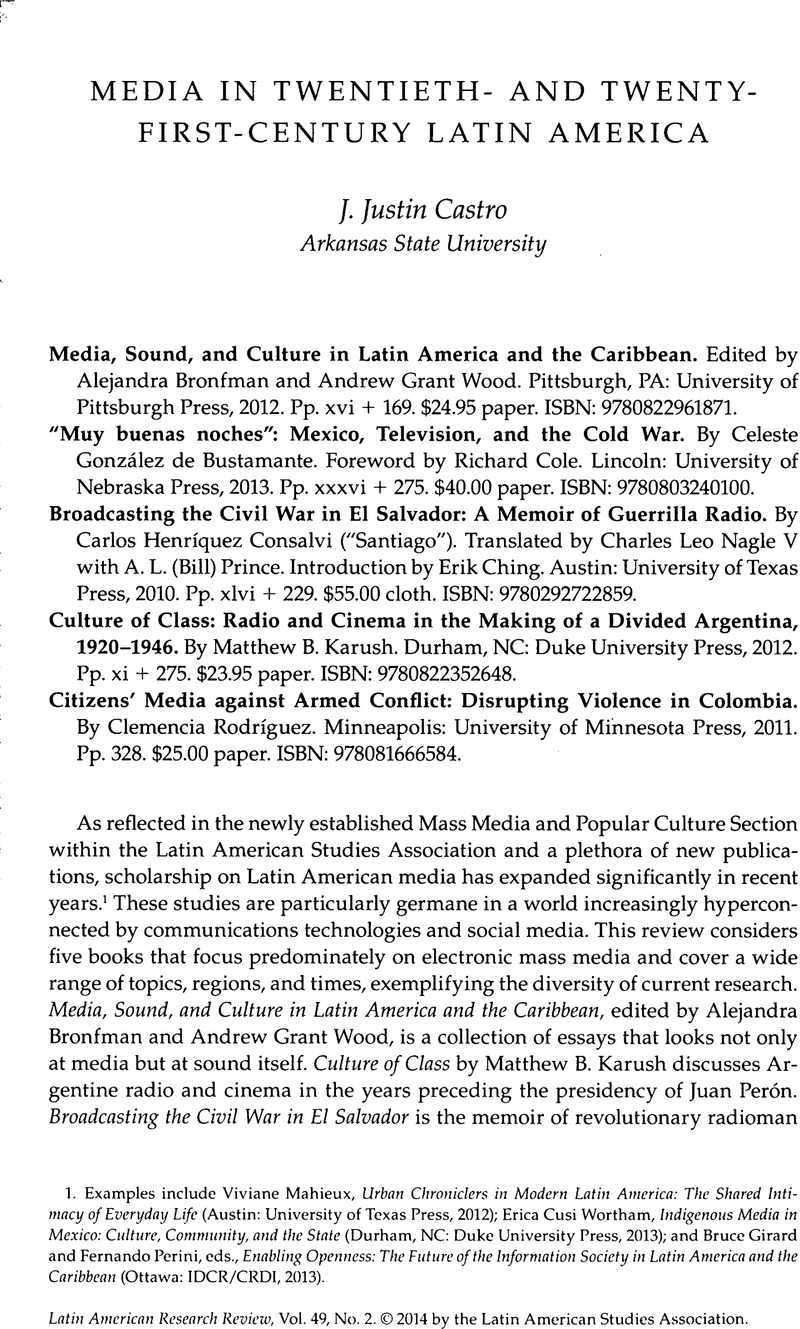No CrossRef data available.
Published online by Cambridge University Press: 05 September 2022

1. Examples include Viviane Mahieux, Urban Chroniclers in Modern Latin America: The Shared Intimacy of Everyday Life (Austin: University of Texas Press, 2012); Erica Cusi Wortham, Indigenous Media in Mexico: Culture, Community, and the State (Durham, NC: Duke University Press, 2013); and Bruce Girard and Fernando Perini, eds., Enabling Openness: The Future of the Information Society in Latin America and the Caribbean (Ottawa: IDCR/CRDI, 2013).
2. Other noteworthy works on Argentine media include Robert Howard Claxton, From Parsifal to Perón: Early Radio in Argentina, 1920–1944 (Gainesville: University Press of Florida, 2007); Beatriz Sarlo, The Technical Imagination: Argentine Culture's Modern Dreams, trans. by Xavier Callahan (Stanford, CA: Stanford University Press, 2008); and James Cane, The Fourth Enemy: Journalism and Power in the Making of Peronist Argentina, 1930–1955 (University Park, PA: Pennsylvania State University Press, 2012).
3. Jürgen Buchenau, Plutarco Elias Calles and the Mexican Revolution (Lanham, MD: Rowman and Littlefield Publishers, 2007), xxi-xxvii; Jürgen Buchenau, “Plutarco Elias Calles and Revolutionary-Era Populism in Mexico,” in Populism in Twentieth Century Mexico: The Presidencies of Lázaro Cárdenas and Luis Echeverría, edited by Amelia M. Kiddle and María L. O. Muñoz, with a foreword by Cuauhtémoc Cárdenas (Tucson: University of Arizona Press, 2010), 38–57.
4. Michael L. Conniff, ed., Populism in Latin America, 2nd ed. (Tuscaloosa: University of Alabama Press, 2012), 7–10.
5. Eduardo Elena, Dignifying Argentina: Peronism, Citizenship, and Mass Consumption (Pittsburgh, PA: University of Pittsburgh Press, 2011).
6. Brian McCann, Hello, Hello Brazil: Popular Music in the Making of Modern Brazil (Durham, NC: Duke University Press, 2004).
7. J. Justin Castro, “Wireless: Radio, Revolution, and the Mexican State, 1897–1938,” PhD diss., University of Oklahoma, Norman, Oklahoma, 2013.
8. See, for example, Claudia Fernández and Andrew Paxman, El Tigre: Emiliano Azcárraga y su imperio Televisa (Mexico City: Grijalbo, 2013); Pável Granados, XEW: 70 años en el aire (Mexico City: Editorial Clio, 2000); and Chappell H. Lawson, Building the Fourth Estate: Democratization and the Rise of the Free Press in Mexico (Berkeley: University of California Press, 2002).